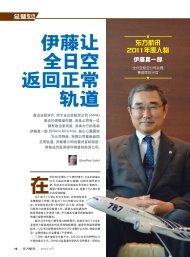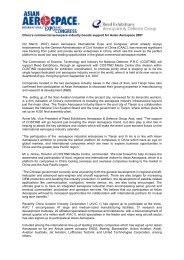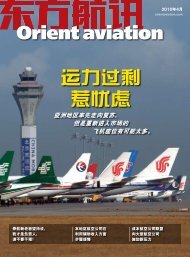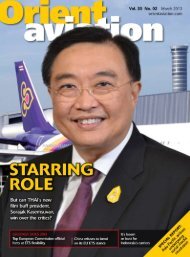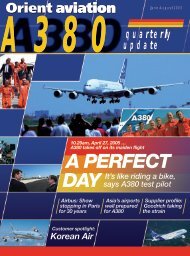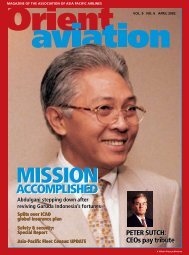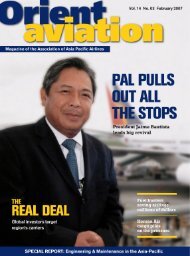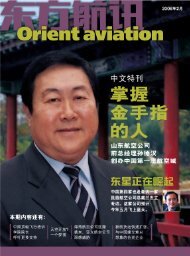LIFE AFTER SQ006 - Orient Aviation
LIFE AFTER SQ006 - Orient Aviation
LIFE AFTER SQ006 - Orient Aviation
- No tags were found...
Create successful ePaper yourself
Turn your PDF publications into a flip-book with our unique Google optimized e-Paper software.
c o v e r s t o r yglobal portfolio by bidding for a stake in AirIndia with Indian partner, Tata Industries.SIA bosses also are talking to otherairlines, although Dr Cheong will not namenames. He does not rule out at some futurestage buying into a Chinese airline. “Whynot?” he said confidently. SIA, through itssubsidiary, Singapore Air Terminal Services(SATS), has a ground handling and a cateringjoint venture in Beijing and its engineeringdivision has a joint venture in Xiamen.SIA is ambitious. It is already influentialon aviation’s world stage and it intends tobecome more so. It has the expertise andthe cash to do so. It has no debt and morethan US$1 billion cash-in-hand to help fulfilits goals.But this is not the time for the companyto be too upbeat, said Dr Cheong. The“humbling” experience of <strong>SQ006</strong> has meantthat the company is looking at the lessonsit can learn from the experience. It is takingstock.But life, and SIA’s game plan, goes on.“I would hope that five years from nowwe would be clearly recognisable as a verylarge global group of airlines and airlinerelatedcompanies. I see Virgin, Ansett andAir New Zealand as just the beginning,” saidDr Cheong.“At the same time, while we will begrowing through our acquisitions and allianceswe will be very much focused on our organicgrowth by adding new destinations andincreasing frequencies.”Dr Cheong has just signed a new twoyearcontract as SIA’s chief executive that willcome into effect in June and take him throughto the age of 62 at the airline. “There will beno more contracts. I will then retire from SIAand look to do something different,” he said.Referring to his successor he said “people hadbeen identified”.Dr Cheong’s achievements in the past27 years have been considerable to say theleast.Born in Malaysia in 1941, he is quick toreject any suggestion SIA’s success is built onhis own business philosophy. “It is not myphilosophy, but the way the company doesthings,” he said. “It is more the culture ofwork. The culture of doing business withinthe company.”There are some constants in that, headded. “We stay with the basics of management,time-honoured basics. Take customers,for example. We think customer all the time.And competition; we believe in competition. Ibelieve much of our success is due to the waywe have been used to competing from theearliest times. That competition has honedmany of our skills.“We don’t go blindly for the latestmanagement fad. We are open to new waysof doing business and new ways of thinking,but it is this adherence to basics, of prudenceof financial management for example, whichmakes it work.”Other executives underscore the importanceof fundamentals. Example: awards area way of life for SIA. Staff still enjoy winningthem, but celebrations are short. Even if theycollect 95% of the vote, a post mortem is heldabout possible shortcomings that cost themthe remaining 5%.Another critical cog in the “globalcompany” strategy is there is no glass ceilingfor non-Singaporeans at SIA.Back in 1993, when many other Asiancarriers were moving to reduce expatriatenumbers and “nationalise” their staff, DrCheong was telling his senior executives SIAhad to search the world for the best, recruitthem and allow them to reach the highestranks, wherever they came from.It is an undertaking he has delivered on.“It’s not just us trying to be fashionable,” hesaid. “We recognised if we were to grow and ifwe are going to be number one, then we mustbe served by the best in the world.“Because you are competing with globalplayers, it is arrogant to think the best in theworld can only be found in tiny Singapore.So starting in the early 1990s we recruitedfresh university graduates in other parts ofthe world to work for us. It wasn’t a questionof finding the best and bringing them in aschief executive or senior vice-president, butbringing them in at the lowest executivelevel and letting them work their way up likeSingaporeans.”SIA has always been an internationalcompany. It operates internationally. But DrCheong believes globalisation means havingbusinesses based all over the world, not justflying there.He is more optimistic than ever that openskies and liberalisation are inevitable. “It’sa philosophy that should be espoused byany self-respecting airline. How else can yougrow? How else can you succeed in a marketSingapore Airlines will be the first airline in the world to put the A380 Very Large Aircraftinto service in 2006with your own skills and merits if you don’thave free competition?”He thinks there is nothing schizophrenicabout the two apparently diverse paths SIAis taking in its expansion quest; being a StarAlliance member on the one hand, yet settingup its own global stable of airline and airlinerelatedcompanies on the other.That may appear to be building analliance group within an alliance group, butnot so, according to Dr Cheong. SIA needsthe world as its market because it does nothave a substantial home market in which togrow, he said.“Why should we apologise for that?In this day and age just about every otherindustry has been, or is being, globalised. Lookat the banks and look at the Telcos. The airlineindustry is practically the last major bastion ofprotectionism,” he said.Some growth comes through alliances,but this is an artificial way, he suggested,20 | <strong>Orient</strong> <strong>Aviation</strong> | March 01



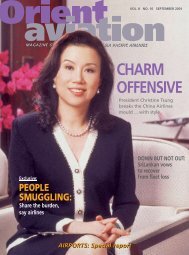
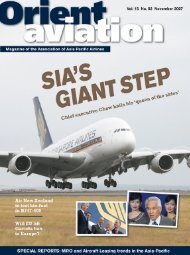
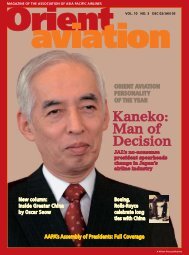
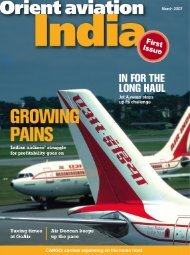
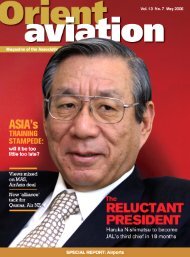
![OAMag-V7N4-Cover [Converted] - Orient Aviation](https://img.yumpu.com/48598575/1/190x255/oamag-v7n4-cover-converted-orient-aviation.jpg?quality=85)
